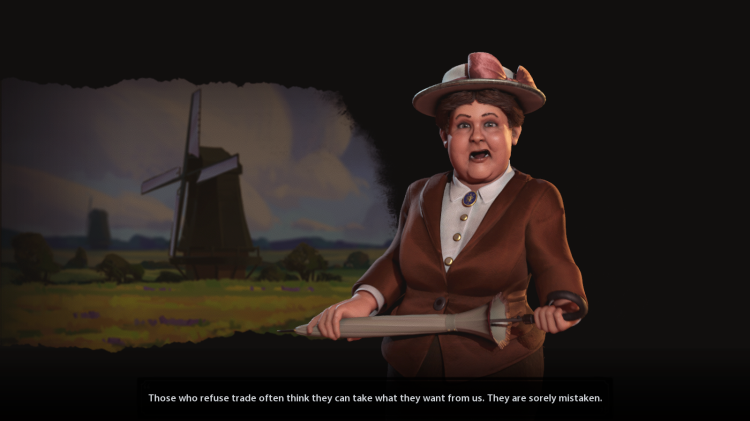My new favorite aspect of Civilization is watching my empire’s symbol flash under a city as it prepares to transfer its Loyalty from its leader to me.
I’m playing Poundmaker, the leader of the Cree, one of the great Native American peoples. Renown traders, I’ve built my empire in such a way that I’m not just trading gold, food, and production with neighboring cities, but I’m also sending pressure with just how much better my civilization is than theirs.
My amusement parks, cities, military, and other wonders first convince the Netherlands’ capital to join my civilization. Then comes their other cities. At last, their last one falls, not to the sword, but with a mighty stroke of the pen.
Now the Cree are not only larger, but Poundmaker’s people are putting out more than twice the gold, culture, and production than before. And I haven’t even launched a war to do so.
June 5th: The AI Audit in NYC
Join us next week in NYC to engage with top executive leaders, delving into strategies for auditing AI models to ensure fairness, optimal performance, and ethical compliance across diverse organizations. Secure your attendance for this exclusive invite-only event.
This is Rise and Fall, the first expansion for 2016’s Civilization VI. Firaxis biggest addition to this long-lived PC strategy-game series is the Loyalty system, which measures how likely citizens of your empire (and others) are to stick with your leadership … or rebel and either found a free city or join another civilization. Governors help manage Loyalty as well. Rise and Fall also adds Eras and Historic Moments, which work together to bring about either ages of glory or woe. Emergencies rally the world against the actions of unruly rulers.
It fixes some of my issues with Civilization VI, giving your new paths to victory. Yet in the 40 or so hours I’ve put in so far, the busywork of managing your districts and the religion mechanics remain irritants, and if you didn’t like them before, Rise and Fall isn’t going to make those any more enjoyable for you.
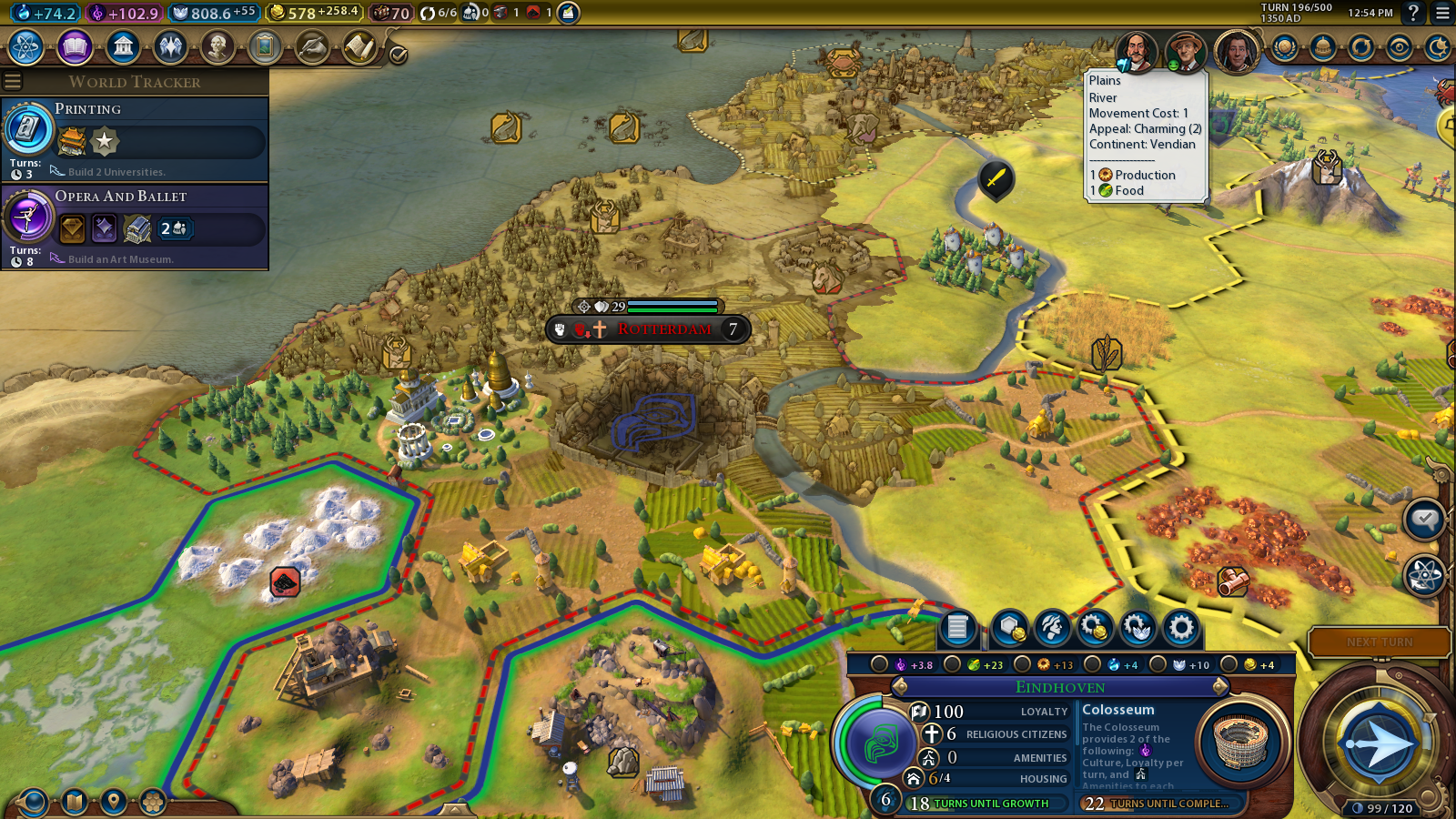
Above: When a city is turning toward your civilization, your symbol flashes below it.
What you’ll like
Loyalty gives you options
My biggest compliant with Civilization VI is that you couldn’t entice cities to join your empire. Loyalty now gives you that option. In my first run, I had trouble making this work, as my Korean civilization’s cities were just too far away from those of others. I watched as cities changed hands between other civilizations, but I was never able to take advantage of the situation.
Poundmaker of the Cree helped me take advantage of the Loyalty system. With a combination of trade routes, which enables Poundmaker to claim a few extra open hexes on the map, and a focus on building amenities, my Loyalty put out enough pressure on The Netherlands to, as I described, first take their capital, then wipe them off the map, city by city. I found this to be a more satisfying round of Civilization VI that I had ever played, even when taking mods into account.
But Loyalty swings both ways. You want to keep your people happy. Governors can help with this. These are new units you recruit as your civilization marches through time. You base them in one city, either one of yours or a city state, and they can affect you empire in a multitude of ways: boosting loyalty, making the burg they’re based in a military strongpoint, improving your economy, making strides in science, and so on. In my playthroughs, it delighted me that I didn’t end up keeping governors in the same cities, as I feared. I moved most of them around to give my burgs the benefits they needed — or the influence I craved, when it came to city states.
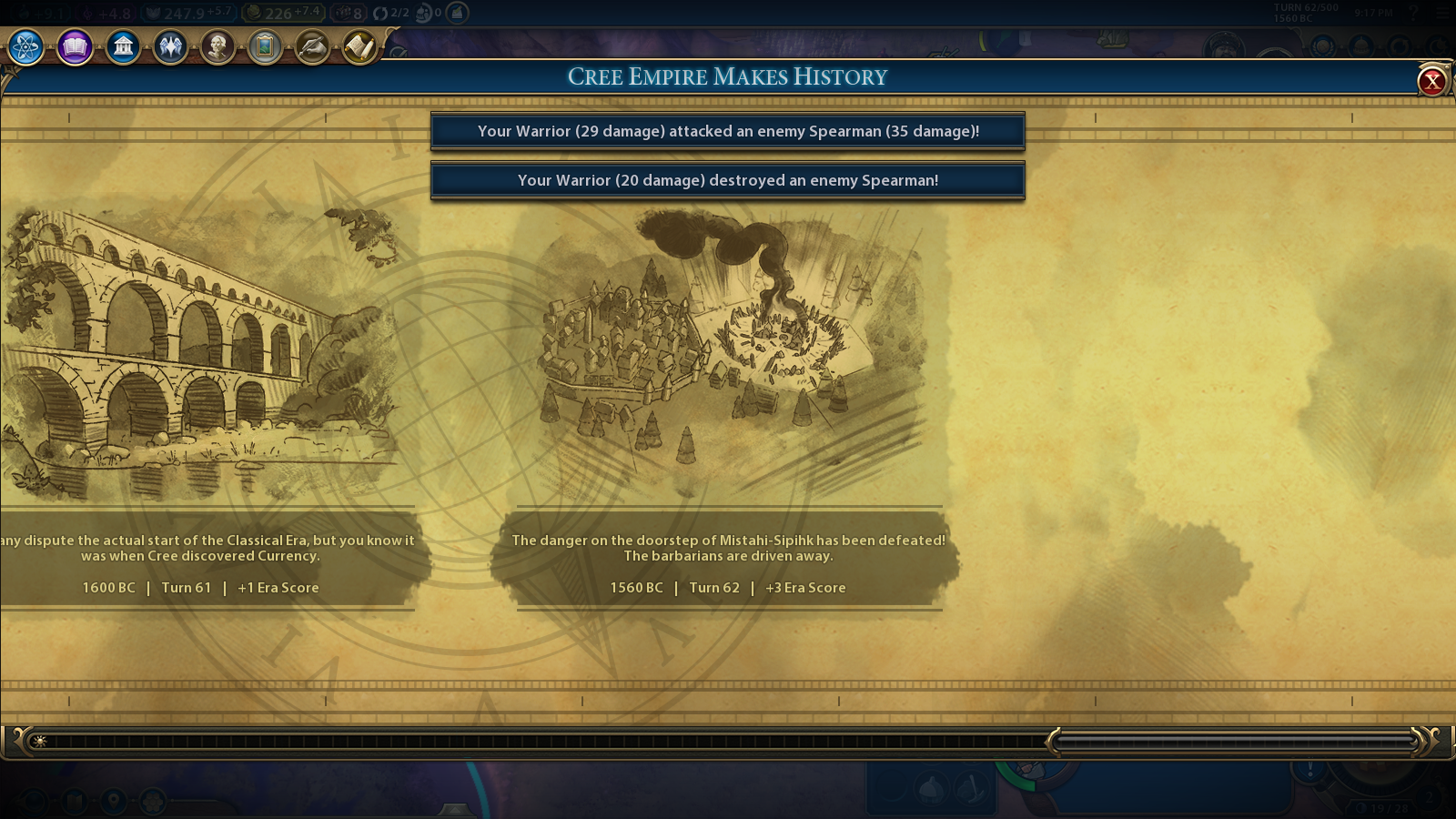
Above: Rise and Fall even turns conquering barbarians into an epic moment.
An epic journey
Rise and Fall’s Era system tracks the historic moments your civilization experiences. Some are trivial, such as the first time you defeat a barbarian or research a tech. But these do more than show your path from small village to globe-spanning empire — they also net your era points, which factor into whether you get a Golden Age or a Dark Age.
Now, if you’re struggling with generating enough Loyalty, it’s important to avoid Dark Ages. These cause it to decay faster than normal, so not only are you losing out on enticing outside cities to join your civ, you could be at risk at your own citizens rebelling against your rule. You’re not doing anything different from what you’d be doing in any standard game of Civ — but you’re reaping extra rewards for it.
I’ve found it rather easy to avoid Dark Ages. You earn era points from so many activities, even successful combats. Stay busy building your cities and wonders, recruiting great people, and destroying barbarians and other invaders, and you stand a fair shot at earning a Golden Era. The trick is doing enough of these that you earn a Herioc Age. With these, you get three Dedications instead of one, giving you multiple bonuses for the next era. My civilizations surged each time I earned one, and my science victory with Korea wouldn’t have happened without the Heroic Age that helped me zoom through the industrial tech tree and open up modern-era choices.
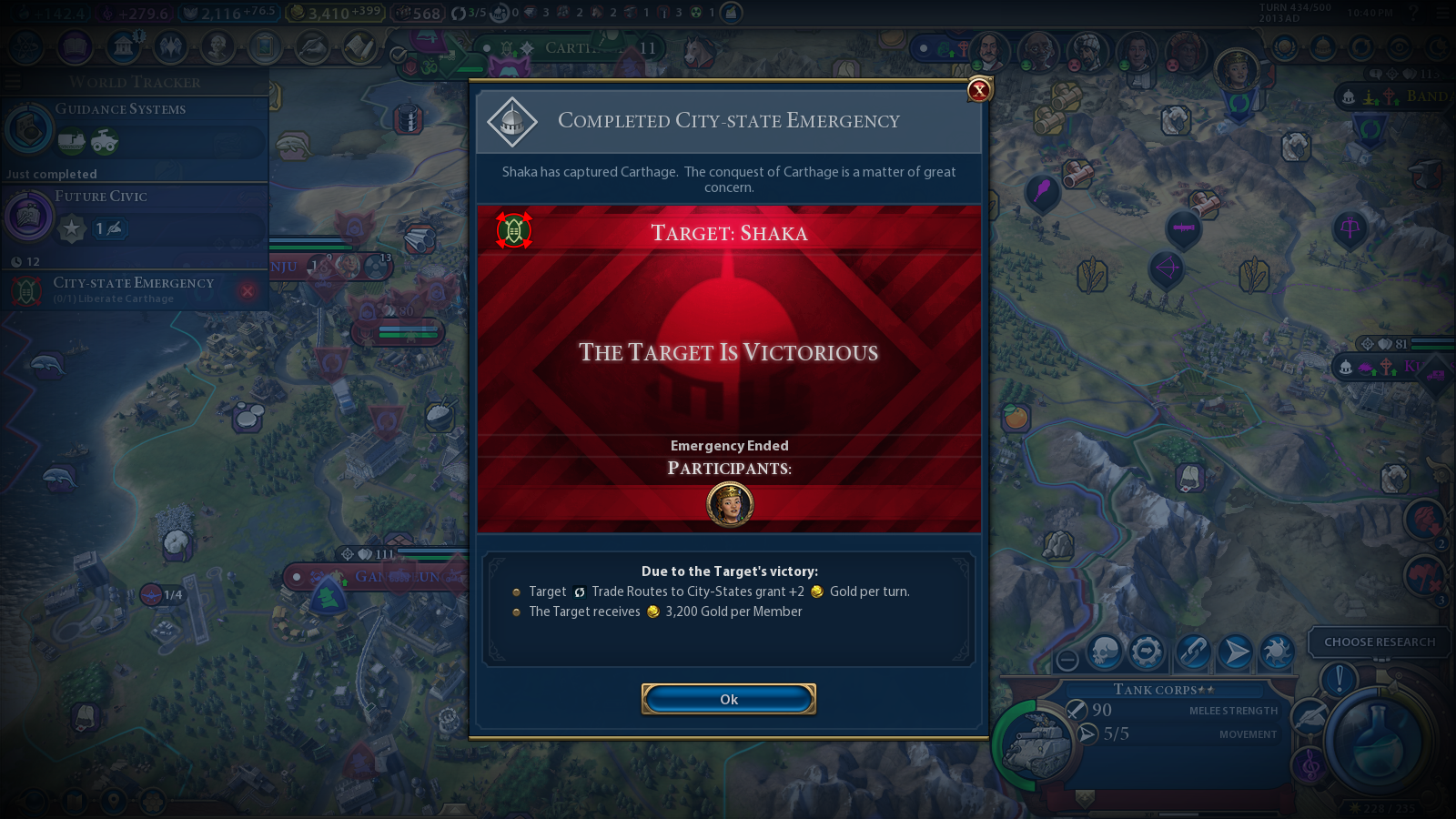
Above: I failed to stop Shaka here, and he profited greatly from his actions.
Red alert
Emergencies are Civ VI’s take on emergent quests. These crop up when another leader is being naughty, like when they drop a nuke, converts the holy city of another empire, or takes over a city-state protectorate. These are fun. When you accept an Emergency, the other leaders have a limited amount of time to resolve it. Do so, and you split a pot of gold with those who assist. Fail, and the transgressor reaps the wealth.
In my run with the Cree, my Civ surged after resolving an Emergency. I got 1,800 gold for liberating an allied city state from Australia, and I used it to build a number of Amenities — which boosted the Loyalty in my civ and enabled me to start converting the Netherlands’ cities to my empire.
What you won’t like
The AI needs help
Firaxis still needs to address the behaviors of world leaders. I’d have friendly relationships — even alliances! — with some, and they’d scold me for actions. Once, Saladin declared war on me despite us having declared a friendship the turn before. Then he never attacked me. He didn’t even attempt to loot my traders near his empire. I just continued my progression to my science victory.
The AI remains far too generous to its friends in trading, offering me what I feel is twice the value for my spare luxuries. I felt like I was robbing them — that’s how good the terms of some of the proposed deals were.
I also found that the AI kept breaking its promises to me, regardless of the situations I found myself in. Friends would promise to stop settling near me or spying on my cities and districts, but it was like they were crossing their fingers behind their backs. I once found a spy of Poundmaker’s attempting to drain my coffers after he twice promised to stop syping on me.
Shaka, when the falls fell
I hate one aspect of Shaka’s design. One of his two agendas is that he hates women leaders. He’s going to be antagonistic toward Korea’s Seondeok or the Netherlands’ Wilhelmina (or Civ VI’s other women), and that means you’re going to have someone who has one agenda against you should you play a women-lead Civ and Shaka’s in your game. It feels so limiting to me.
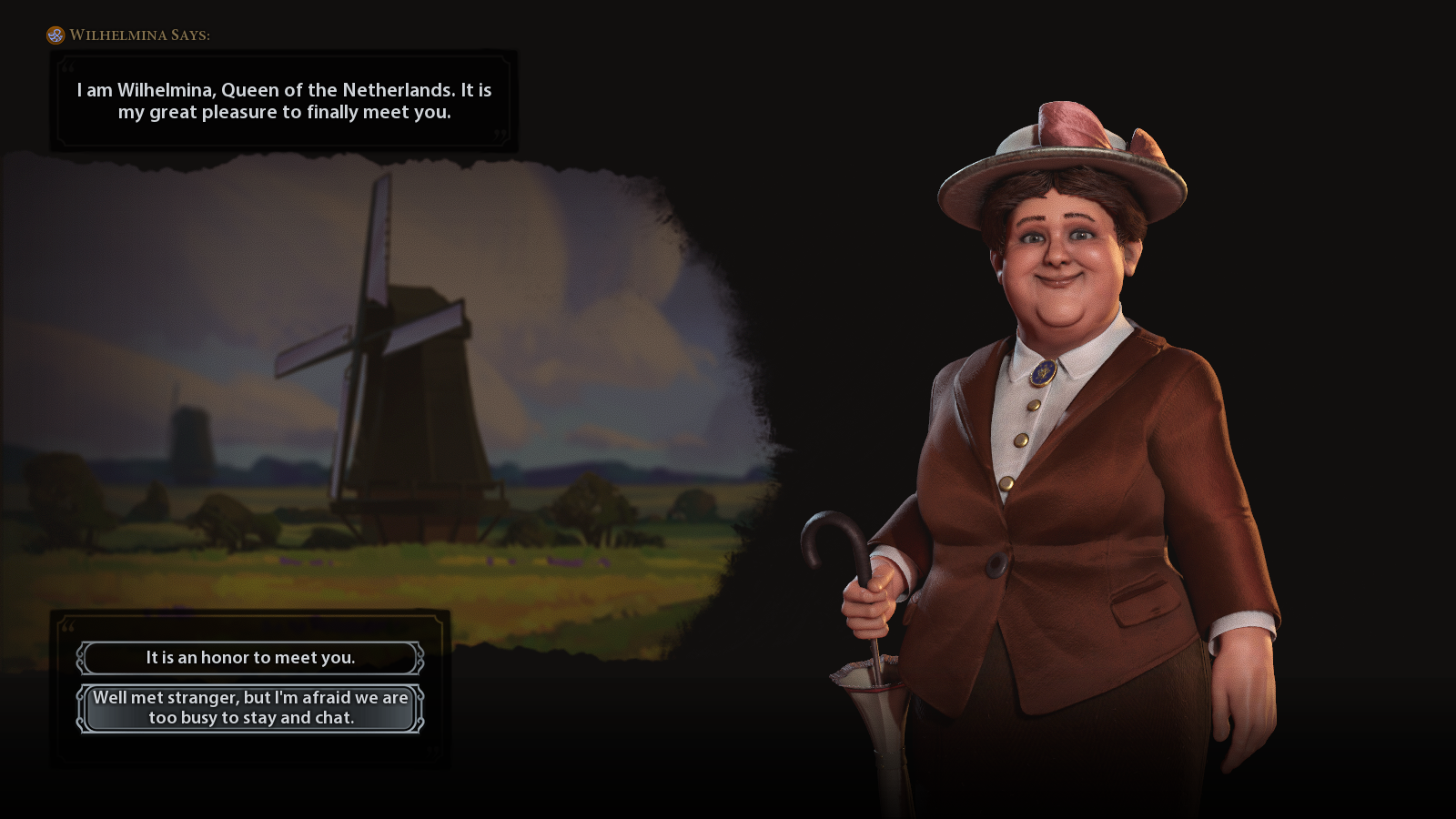
Above: Queen or governess?
Leader … or Mary Poppins?
I don’t like how the Wilhelmina looks in Civ VI’s cartoony style. She runs a civ! She was one of the Dutch’s most inspirational leaders, rallying her subjects during both World Wars. But she looks like one of the rejects interviewing for the governess job in Mary Poppins.
Conclusion
Civilization is at its best when it enables you to tell your own stories. But at release, Civ VI didn’t do such a good job at that. Rise and Fall fixes this in many ways, giving your better ways to expand your civilization without resorting to combat. It adds a quest-like element with a significant penalty or reward, and most of its news leaders add variety to the game.
Firaxis will need to watch how the AI reacts as thousands of fans start playing and spreading their own stories and respond with patches to fix the issues. And we’ll have an even better idea of what Rise and Fall does after a few months, once modders get their hands on the new mechanics and deliver tweaks and all-new creations based on the Civ sandbox.
Score: 82/100
Civilization VI: Rise and Fall is out now for PC. The publisher gave GamesBeat a Steam code for the purposes of this review.
